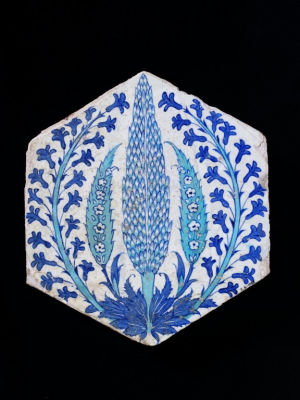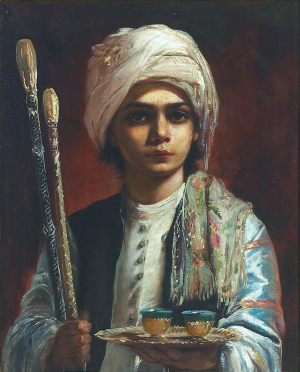(Boylove Documentary Sourcebook) - A Defense of the Biographical Reputation of İshak Çelebi through His Portrayal as a Chaste Pederast in an Anecdote from 'The Essence of History' by Gelibolulu Mustafa 'Âlî: Difference between revisions
Created page with "thumb|center|Hexagonal fritware tile painted under the glaze in turquoise and blue on a white background. The pattern includes a central turquoise cypress tree flanked by a stem of blue hyacinth flowers on each side. Made in Iznik, Turkey. Ottoman, ca. 1540–1550. From the Çinili [[Hammam|Hamam (Tiled Bath-house) in the Zeyrek distri..." |
|||
| Line 43: | Line 43: | ||
==External links== | ==External links== | ||
*[https://academia.edu/1153738/Ishaq_Chalabi_and_his_shahrangiz_2007_ Ishaq Chalabi and his shahrangiz (2007) (Academia.edu)] | *[https://academia.edu/1153738/Ishaq_Chalabi_and_his_shahrangiz_2007_ Ishaq Chalabi and his shahrangiz (2007) (Academia.edu)] | ||
*[https://greek-love.com/near-east-north-africa/turkey/the-rules-of-social-gatherings-by-mustafa-ali <i>THE RULES OF SOCIAL GATHERINGS</i> BY MUSTAFA ÂLI, 1599-1600] | *[https://greek-love.com/near-east-north-africa/turkey/the-rules-of-social-gatherings-by-mustafa-ali <i>THE RULES OF SOCIAL GATHERINGS</i> BY MUSTAFA ÂLI, 1599-1600 (Greek Love Through the Ages)] | ||
*[https://greek-love.com/near-east-north-africa/arab-islamic-loved-boy-age-pederasty THE AGE OF THE LOVED BOY IN THE ARAB-ISLAMIC WORLD, 1500-1800 (Greek Love Through the Ages)] | *[https://greek-love.com/near-east-north-africa/arab-islamic-loved-boy-age-pederasty THE AGE OF THE LOVED BOY IN THE ARAB-ISLAMIC WORLD, 1500-1800 (Greek Love Through the Ages)] | ||
Latest revision as of 04:36, 27 April 2022

From "Naming the Beloved in Ottoman Turkish Gazel: The Case of İshak Çelebi (D. 1537/8)" by Selim S. Kuru, in Ghazal as World Literature II: From a Literary Genre to a Great Tradition. The Ottoman Gazel in Context, edited by Angelika Neuwirth, Michael Hess, Judith Pfeiffer and Börte Sagaster, Istanbuler Texte und Studien (Istanbul: Orient-Institut Istanbul; Würzburg, Germany: Ergon Verlag, 2006). Footnotes omitted.
Note: The anecdote quoted by Kuru in the excerpt below appears in The Essence of History (كنه الأخبار Künhü'l-aḫbār, c. 1591–1599), an Ottoman Turkish historiographical work composed by Gelibolulu Mustafa Âlî bin Ahmed bin Abdülmevlâ Çelebi.[1][2]
İshak Çelebi was a renowned müderris (professor), who in the course of his career taught at seven different medreses (colleges) in various cities of the Ottoman Empire, including his hometown Üsküp. He also worked as a judge in Damascus, where he died around 943 A. H. (1537-8). Like many other müderrises of his time, he was also a well regarded poet.
[...]
The Ottoman historian Gelibolulu ‘Âlî (1541-1600), who was also a biographer of poets, relates an anecdote about İshak Çelebi that has implications of a commentary on boy-love, or mahbubperestî. Once, İshak Çelebi came across a “shadow-holding cypress, a playful sapling with rosy cheeks” and, losing all his power of judgment, followed him wherever he went. One day he followed the boy even to his home. The boy’s father, who was an imam and a friend of İshak Çelebi’s, appeared at the door and, understanding that his son attracted the famous müderris to his doorstep, welcomed the poet. That day İshak Çelebi did not teach but, staying at the boy’s house, “gathered the illuminations of pleasure from the enjoyment of the cheeks of that heart-snatcher”. At night the father hid behind a vessel and watched İshak Çelebi’s behavior towards his son. ‘Âlî continues the story as follows:
“İshak Çelebi takes his ablutions and, turning his face away from the boy’s mirror of beauty, he turns towards Mecca to pray. (...) Then he turns towards the niche of the beautiful boy’s eyebrow, and whenever the boy throws away his covers, İshak tucks him in. In this manner, he does not sleep until dawn, continuously contemplating the boy’s beauty. Witnessing the situation, the boy’s father believes in İshak Çelebi’s virtue and renders his son to his service.”
In this anecdote ‘Âlî defends İshak Çelebi, who is slighted by other biographers for being a mahbûb-dost, i.e. boy-lover. Clearly, ‘Âlî’s attempt to rewrite İshak Çelebi as a virtuous sufi who follows boys for their being signs of God rather than for any sexual intent, written almost a hundred years after his death tells more about ‘Âlî and his period than about İshak Çelebi.

References
- ↑ Selim S. Kuru, "Naming the Beloved in Ottoman Turkish Gazel: The Case of İshak Çelebi (D. 1537/8)"; Angelika Neuwirth, Michael Hess, Judith Pfeiffer and Börte Sagaster, eds., Ghazal as World Literature II: From a Literary Genre to a Great Tradition. The Ottoman Gazel in Context, part of the Istanbuler Texte und Studien series (Istanbul: Orient-Institut Istanbul; Würzburg, Germany: Ergon Verlag, 2006), p. 172.
- ↑ https://en.wikipedia.org/wiki/Mustafa_Ali_(historian)
See also
- Adult friend (dictionary)
- Age of attraction (dictionary)
- Boylove
- Ephebophilia
- Ghilman
- Köçek
- Loved boy (dictionary)
- Minor-attracted person (dictionary)
- Pedophilia
- Tellak
- Young friend (dictionary)